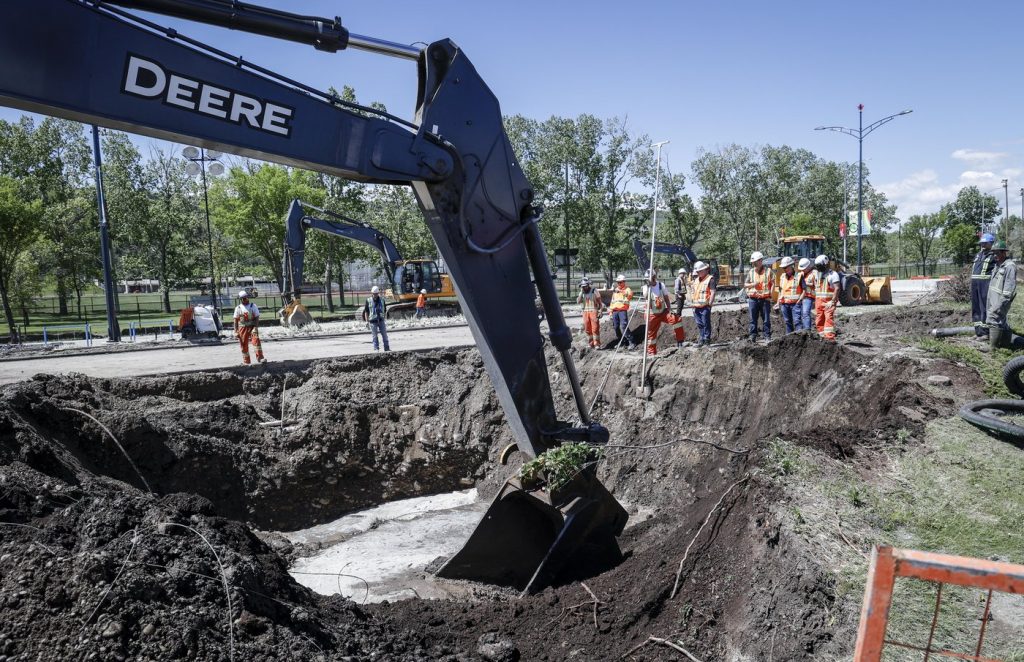Alberta no longer wage leader in Canada as cost of living rises: report
Posted May 19, 2024 10:38 am.
Last Updated May 19, 2024 11:31 am.
Alberta is falling behind in wages, with weekly, hourly, and yearly wage increases being well below the rest of the country, according to a new report.
From housing to education fees, gas, and groceries, everything has gone up in price. Economist and lead researcher of the report from the Alberta Federation of Labour (AFL) Dr. Jim Stanford says Alberta’s two major cities are among the most expensive in the country.
“The absolute cost of living in Alberta is quite high, Calgary and Edmonton are two of the most expensive cities in all of Canada and are right up there with Vancouver and Toronto,” he told reporters at an event.
“So we’re making less money in Alberta but paying higher prices.”
Alberta’s average wages were only three per cent higher than the Canadian average in 2023, a considerable drop from a 17 per cent advantage in 2013, meaning the purchasing power of an average hour of work in Alberta has fallen 10 per cent in the last decade.
The wages for all employees weekly still show a small increase compared to the rest of the country, with a 2.3 per cent increase every week, lower than every province, and well below the Canadian average of 3.8 per cent. B.C. had the highest weekly wage increase at over 4.5 per cent.
“To the cost-of-living crisis, one is how much money you’re making, and on that score, Alberta has done the worst of any province,” Stanford said.
Watch: The costs of paying a living wage
Alberta’s unemployment rate was higher than the Canadian average by one per cent, and according to the report, it was seven per cent in April.
On average over the past five years, unemployment was a percentage point higher than the Canadian average.
Hourly wage increases in the province have been the “weakest,” with annual wage increases averaging just over two per cent per year.
Minimum wage has also not gone up since 2018, with the report noting how Alberta has a zero per cent increase.
The report also notes how Alberta has the highest tuition increases in the country, made in part by budgets over the past few years that have seen cuts to funding for universities.
“This report is an alarm bell and an urgent call to action,” said AFL president Gil McGowan in a release.
“The living standards of all Albertans are collapsing. We need to fight to restore them. The first step is acknowledging we have a problem. The second step is to convince the government to abandon policies that are hampering economic growth and suppressing wages.”
Related Stories:
- 55% of Alberta post-secondary students living with parents while finishing school: poll
- How much do you need to earn to live in Alberta?
- Alberta post-secondary students welcome affordability measures, but wish they had come years earlier
CityNews spoke with several Calgarians about the cost of living and the shortened wage increases, and several say it has impacted their living situations.
“I moved here because it was affordable, and now definitely seeing that everything is rising: housing costs, groceries. So yeah, it made me honestly think twice about whether I stay here or not,” one man said.
“Nowadays the change is so much that you’re really picking and choosing when you’re filling up your car, how much you’re using it, what you’re buying in the grocery store, you’re looking for the sales, you’re looking for the discounts to make it more affordable,” another Calgarian said.
Stanford’s report released Saturday shows the share of the Alberta economy going to labour compensation has dropped by eight percentage points, as well as lower rates of economic growth, productivity growth and business investment.
“In Alberta, we just grew more slowly than any other province — half as fast in Alberta as they grew in B.C. or Quebec or some of the other leading provinces — yet our inflation was exactly the same,” he said.
Anupam Das, a professor of economics at Mount Royal University, says there is more than meets the eye on the standard of living.
“We have to look at it more holistically. There is not one reason which caused workers’ standard of living to go down, but there are multiple reasons,” he said.
Despite the data, many still consider Alberta more affordable; however, they believe reports like this should be considered to implement policies for the sustainable economic growth of the province.








